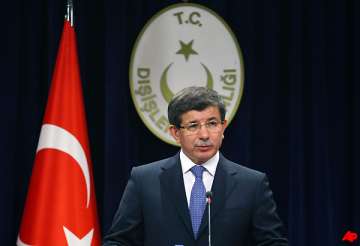Turkey Slaps Economic Sanctions On Syria
Beirut, Nov 30: Turkey slapped tough economic sanctions on Syria on Wednesday, freezing assets of officials involved in the government's crackdown on an 8-month-old uprising, suspending ties with the nation's central bank and banning all

Beirut, Nov 30: Turkey slapped tough economic sanctions on Syria on Wednesday, freezing assets of officials involved in the government's crackdown on an 8-month-old uprising, suspending ties with the nation's central bank and banning all military sales.
The move comes on top of sanctions already imposed by the Arab League, the United States and the European Union. Turkey is Syria's neighbor and largest trading partner, but its leaders have turned on Damascus because of its violent campaign to crush the revolt.
“Every bullet fired, every bombed mosque has eliminated the legitimacy of the Syrian leadership and has widened the gap between us,” Turkish Foreign Minister Ahmet Davutoglu told a news conference in Ankara, Turkey. “Syria has squandered the last chance that it was given.”
Turkey and Syria did $2.4 billion in trade last year, according to the Turkish embassy in Damascus. The sanctions will bite an already ailing economy in Syria, where President Bashar Assad is trying to crush a remarkably resilient uprising against his autocratic rule. The United Nations says at least 3,500 people have been killed in the crackdown.
“Syria must immediately cease using force on the people and the forces must immediately withdraw from the cities,” Davutoglu said.
The Turkish foreign minister announced a set of nine sanctions, including a travel ban on Syrian leaders and the freezing of their assets. Businessmen “strongly supporting” the regime would also be sanctioned, Davutoglu said, in a direct threat to a mainstay of regime support.
Syrian business leaders have long traded political freedoms for economic privileges in Syria, where the prosperous merchant classes are key to propping up the regime.
The opposition has tried to rally these largely silent, but hugely important, sectors of society. But Assad's opponents have failed so far to galvanize support in Damascus and Aleppo—the two economic centers in Syria.
The sanctions, however, could chip away at their resolve.
Davutoglu also said Wednesday that Turkey was imposing a travel ban and freezing the assets of “certain officials who are members of the main cadre of leaders, who are the subject of claims of exerting violence against the people or of resorting to illegitimate means.”
“All shipment of arms and military equipment through Turkey's land, airspace and seas ... will be prevented,” he said.
He said Ankara was suspending all ties to the Syrian Central Bank, freezing any Syrian government assets in Turkey and suspending any loan deals. Future dealing with the Syrian Trade Bank would be suspended, while current deals would continue, Davutoglu said.
He also announced the suspension of a joint economic and political cooperation council between the two countries “until a legitimate leadership that is in peace with its people comes to power in Syria.”
Dubai's government prompted speculation Wednesday that a proposed Arab League ban on Syria flights could soon take effect.
In a post on Twitter, the city-state's official media office said the United Arab Emirates' two main carriers, Emirates and Etihad Airways, would stop flying to Syria next week.
The post was later deleted. An official at the media office, who wasn't authorized to discuss the matter and spoke on condition of anonymity, said it had been posted in error.
Etihad said Monday it was reviewing its flights to Syria as a result of the sanctions. The government-owned airline, based in the Emirati capital Abu Dhabi, urged passengers booked on flights to Damascus to get in touch if they want to change their flight plans. It noted that an Arab League decision to ban flights could be made within a week.
An Etihad spokesman said Wednesday the carrier is sticking to its previous statement. Emirates didn't immediately respond to a request for comment Wednesday.
Also Wednesday, the British-based Syrian Observatory for Human Rights said dozens of tanks and armored personnel carriers stormed the village of Dael in the southern Daraa province early in the morning amid heavy gunfire.
All communications with the village were cut at dawn, including mobile, land lines as well as electricity, the observatory said.
Another activist coalition, called the Local Coordination Committees, also reported explosions and deployment of military in Dael and said communications had been cut.
Assad has tried to contain the uprising in part by promising reform, but the opposition has largely brushed them off as too little, too late.
On Wednesday, state-run TV announced that more than 900 detainees involved in the uprising were released from prison in an act of amnesty.